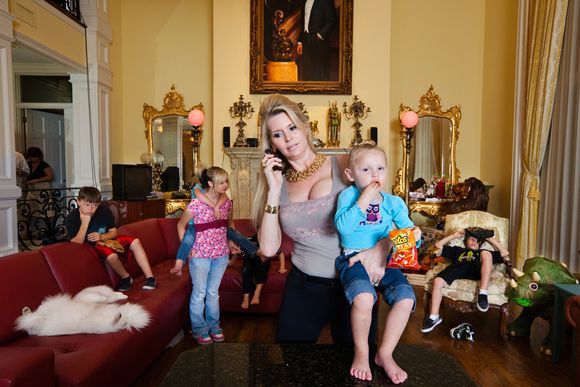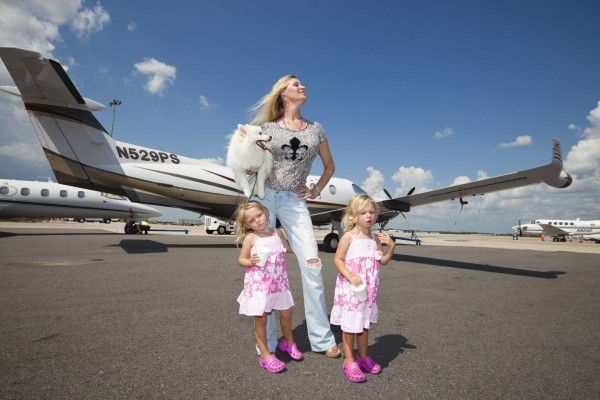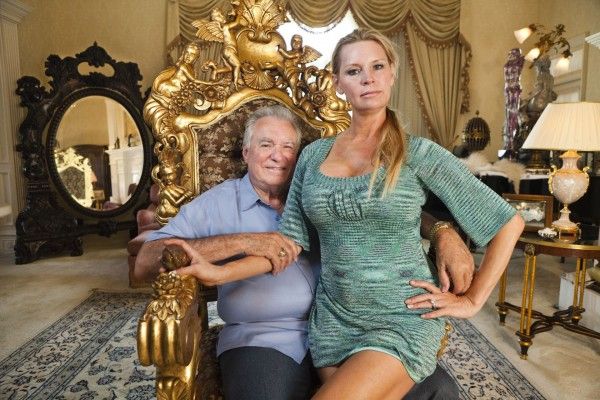The fascinating and compelling documentary The Queen of Versailles tells the story of a billionaire family and their financial challenges in the wake of the economic crisis, proving that even the extremely rich are not immune. The rags-to-riches story of David and Jackie Siegel begins with their construction of the biggest house in America, and then falls apart when their real estate empire falters, leading to major changes in the lifestyle of the household, which includes eight young children and various domestic staff. It is a tale that is familiar to many, but on a scale that is astonishing.
During this recent exclusive phone interview with Collider, director Lauren Greenfield talked about what inspired her to make this documentary, how long the whole process took, her journey with the Siegels, getting close to her subjects while still remaining a documentarian, why she’s always been intrigued by wealth and consumerism (which she is currently doing project about, for next year), and what drew her to documentary filmmaking over fiction work. Check out what she had to say after the jump.
Collider: What inspired you to make this documentary? When you met Jackie Siegel, what led you to believe there was a film there?
LAUREN GREENFIELD: It was probably a lot more step by step than it feels at the end, looking back. I was interested in Jackie, from the time I met her. I met her really randomly. I was working on a photography project about wealth and consumerism, and had been for a number of years. I was photographing Donatella Versace and following her when she was opening up a new store in L.A. Jackie was just one of the customers who was flown in to celebrate the new store, and I made a picture of her purse and two other purses that ended up as one of the Time Magazine pictures of the year. It’s maybe no coincidence that I started talking to her because Jackie is a very gregarious, fun person. Her openness and generosity of spirit was, in a way, what allowed me to get to know her, in the first place. She had an unusual accessibility that you don’t often see with great wealth. I don’t know if it’s because of her humble origins, or it’s just her nature. Even the people who grew up with her always talked about her generosity of heart. She just has this down-to-earth quality that somehow she’s been able to keep, all of these years.
That’s how we got to know each other. So, when she told me that she was building the biggest house in America, which I didn’t believe at first, I wanted to see it. I went down to Florida and saw the house she lives in now and all of her children, who also don’t act like rich kids, in some ways. There’s a real feeling of freedom and this fantasy life that the money provides. So, when I heard her story and I saw the house, I did feel like there was a movie there, so I started to film. But, you never know if it will pan out or if people will continue to give you access. What happened was that we got to know each other more and more and the access deepened, and then on the fourth trip in 2010, when they had to put the house on the market, it was clear that the story was really changing. On that trip, a lightbulb went off and I realized that their story was important in ways I didn’t realize before. By that point in my photography, I had photographed a foreclosure city in the Inland Empire in California, and I had photographed the crash in Dubai. So, when I saw them giving up their dream house and putting it on the market, I realized that their story was a super-sized version of what so many people had gone through, and was an allegory about the over-reaching of America.
From the time that you started with the Siegels until you had the final cut put together, how long did that whole process take and how did you figure out the story you wanted to tell?
GREENFIELD: It took three years. I shot about 200 hours of footage. There were relatively short trips where I would spend between five and ten days, but they were very intense. Jackie moves very fast. It was always really hard to keep up with her. They’re very unpredictable. I was always keeping the crew working longer than we should have been. I didn’t know what the structure of the story would be until I was in the edit room. It was a process. But, I did feel what the story was, as I was going. Once their fortunes changed, it did feel like their story was a big size version of what was going on with so many people in America, and also an unbelievable version. These are the people that you thought would never be affected. When David told me that he had banked everything on his business and that he had never taken anything off the table and never put anything aside, it was on the same trip that the house went for sale. He personally guaranteed the business, and he and the business were one in the same. That’s when I realized the stakes, and that’s what changed the drama of this film. Of course, I didn’t know if he would save it in the end and I didn’t know if they would recover. He’s an incredible businessman. The very first interview, when he told me his story, he had many stories of challenge and success.
Does it surprise you that David Siegel has decided to say this film is hurtful to his reputation?
GREENFIELD: It’s interesting because I think the reason that I was able to make the movie and that they were willing to continue to film, even when things got hard, is that they never felt any shame about what was going on. In some ways, David felt that what was happening to him was the problem with the American dream and the problem with the American economy, and that he was victimized by the banks. And, he really was. He was on both sides of the stick. He built a 52-story, $600 million building and the lenders lent him the money and knew he was going to pay it off by making sales, which they were also financing. Then, they cut off the financing and he was like, “How am I supposed to make sales and pay you?,” and they were like, “Tough luck! Give us the building.” So, he was victimized.
I don’t think he ever saw any shame in telling the story, but I think he would have liked the story to have ended differently and to have ended victoriously. It might have. Based on his history, it could have gone another direction. But, the winds of this economy are very powerful and have felled whole countries, like Dubai, and Dubai is recovering now, too. It was a hard blow and I understand that it’s hard. Vegas was so important to David. It was the pinnacle of his career. It was $400 million that he had invested of his life savings. It was $2 billion that he was going to make. It was this emotional legacy that related to his own parents and going to Vegas, as a child. The name of his company was in the brightest lights of Vegas. And, losing that was very painful. Jackie said that he was in mourning, after he lost it, and Richard, his son, likened it to losing a loved one. I think that’s hard to relive and to be reminded of, in the film.
When you do a documentary like this, do you worry about getting too close to your subject?
GREENFIELD: In my photography and filmmaking, I’ve always gotten close to subjects, but you remain a filmmaker and you remain a documentarian. It’s not like you’ve become a new bestie. I’m always filming. I’m always clear about my role. There was never any agreement about approval, or anything. You always have to keep your ability to tell a truthful story. But, what getting close to the subject, in this case, allowed me was to really see what was going on, and really bring out the emotion and the humanity of their situation, and to tell an empathetic story where people could identify with the characters and see their own mistakes mirrored in them, and not be repulsed by them.
Are you currently working on any photography or film projects?
GREENFIELD: I’m working on a photography book about wealth, for next year. That really brings together work from the last 20 years, about the boom and bust, and our relationship to consumerism.
What is it about wealth and consumerism that initially interested you and made you want to explore that subject so much deeper?
GREENFIELD: It’s hard to say because I’ve been looking at it, in different ways, for a long time. It would probably take an intense psychological profile. But, my first project out of college was about the French aristocracy, and I lived with an aristocratic family when I was 14. Maybe that’s part of it. I’ve always been a social observer. My first project was about how the aristocracy survived, even though they didn’t have the money or political privilege that originally defined them.
What is it that interests you in making documentaries, as opposed to works of fiction?
GREENFIELD: It would be fun to direct a fiction movie, but I’m really a documentarian, through and through. I feel like, if I ever tried something in fiction, it would be very much based on my documentary experience. The documentary filmmaking, in a way, is similar to the documentary photography. I’m really interested in real people and real stories, and what those stories tell about our values and our culture. I think, if I made a fiction film, it would probably be about the same material, but playing with fictional characters. With this story, truth is definitely stranger than fiction.



